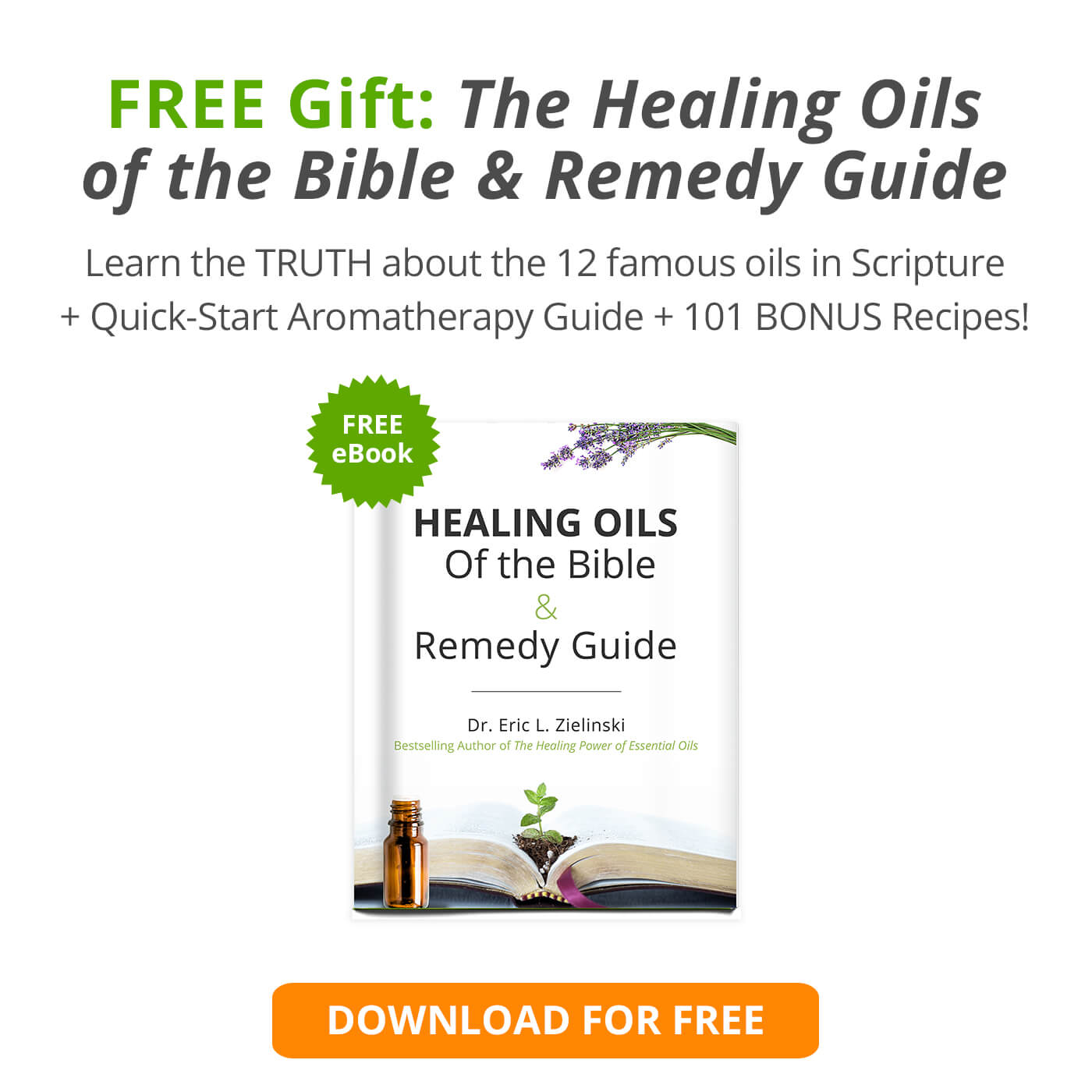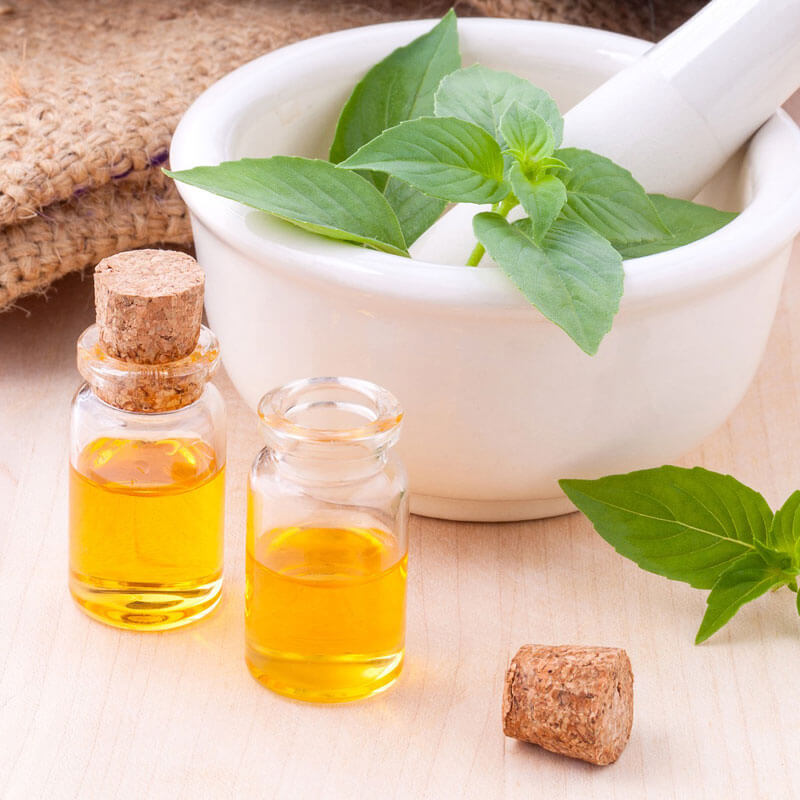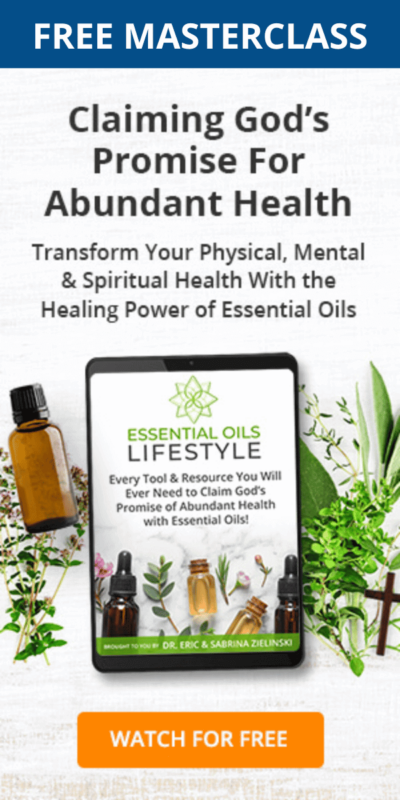People all around the globe can testify that using essential oils for oral health is one of the best decisions you can make for your body. Not only are they extremely effective at managing mouth pain and gingivitis, when used properly essential oils can help reduce your risk of chronic disease.
You may be surprised to learn that some experts claim that 80-90% of all disease is linked to oral health and maintaining a proper microbiome balance starts with a clean mouth!
Table of Contents
- Essential Oils in Dentistry
- Easy DIY Applications
- Managing Oral Health with Essential Oils
- The Diabetes & Oral Health Connection
- Atherosclerosis is Rooted in Oral Health
- Diabetes & Oral Infections
- Oral Health, Diabetes and Heart Disease Axis
- Stop Gum Disease with Essential Oils
- Gum Disease Demystified
- Homemade Tooth Powder Recipe
- Homemade Mouthwash with Essential Oils
Essential Oils in Dentistry
We know from childhood visits to the dentist that bacteria in the mouth cause all sorts of disease and ill effects, but we also know from growing interest in holistic oral health that not all bacteria are bad. For this reason, antiseptic mouthwashes that kill everything on contact may not provide the best option for our oral needs. But essential oils, while often suspect as well due to their germ-fighting capabilities, may actually provide a very beneficial, functional option in this area of our healthcare.
Natural products are, thankfully, much less concerning than man-made, over-the-counter products, so essential oils give us little reason to be concerned about broad elimination of oral bacteria. For example, in the words of Robert Tisserand: “Whether [essential oil] constituents might then negatively affect the bowel flora is pure speculation.” (1) In this same regard, we cannot assume that all oral flora are negatively impacted by exposure to essential oils. Their applications in oral health tend to work to maintain balance rather than upset it, making them a much more reliable choice for oral health than harsh antiseptic formulas.
One recent example comes from a 2014 study published in the Journal of International Oral Health, entitled “Possible Use of Essential Oils in Dentistry.” This review provides an overview of research that demonstrates essential oil’ potential in helping maintain oral health. The full text is available for free, but there are a few key points about essential oils for oral health use that I will highlight here: (1)
- Supports oral hygiene. A solution of essential oils and ethanol achieved better results in inhibiting the growth of subgingival periopathogens (a cause of gingivitis) than a rinse with essential oils without ethanol or a saline control. As a bonus, the essential oil solution won’t stain teeth as other options, such as chlorhexidine rinses have been known to do. (2)
- Relieves anxiety. Lavender essential oil has been shown, in a variety of circumstances, to lessen mild anxiety and calm heightened emotional states. Utilizing it in dental waiting areas has been shown to calm nervous patients and even lessen perceived pain during needle insertions. (3,4) Another anxiolytic, orange essential oil, can be useful for anxious children, with inhalation reducing cortisol levels in saliva and slowing anxious pulse rates. (5)
- Benefits in wound care. Wound dressings that include protective essential oils, clove in particular, were shown to improve healing time and therapeutic effects in one prominent study. (6)
- Aids in dental implants. When essential oils for oral health, notably melissa and lavender, are applied to dental implants, they have been shown to limit the amount of biofilm produced. (7)
- Antimicrobial activity. One study demonstrated the ability of some essential oils in exceeding the antimicrobial benefits of methylparaben – a substance typically used in the preservation of various cosmestics. While essential oils may not automatically replace the preservatives we typically see used in the cosmetic industry, we do have reason to believe that they may serve a supportive role in providing antimicrobial effects. (8)
Easy DIY Applications
So, how does one use essential oils for oral health and to clean their prosthetic devices of biofilm? Quite simply really!
- Make a cleansing solution. Add 25 drops of essential oil to 1/4 cup of 190 proof alcohol and stir. Slowly add in ¾ cup distilled water. Add your oral prosthetic and allow it to soak for 15 minutes. Dispose of solution after use.
- Brush. Using your homemade toothpaste, rub/brush dental implants and allow them to receive the same TCL you’d give your God-given pearly whites! And, of course, the same strategy can be used for people without implants.
Here’s a rundown of some essential oils for oral health facts that will help you apply them in holistic oral health preparations:
- When brushing is contraindicated – as can be the case with severe fever, indigestion, asthma, coughing, vomiting, and mouth ulcers – you can achieve a deep clean by oil pulling with essential oils blended in coconut oil, preventing bad breath and gingivitis. (2, 3, 4)
- Hospice patients diagnosed with terminal cancer have been helped with peppermint, lavender, tea tree, and geranium blended for oral health purposes. (12)
- Clove essential oil is an antimicrobial standby. (13)
When filling your oral health natural medicine cabinet, you have several oils to choose from.
Three of the most effective and commonly used essential oils for oral health are peppermint, orange, and clove. Combinations often found in traditional remedies utilize these oils heavily, with others added for synergy and added benefits. Here are some blends of the best oils to use for oral health:
- Lavender to battle canker sores: dilute 3 drops in 1 tablespoon of a carrier oil and apply twice daily.
- Peppermint to temper halitosis: Use peppermint essential oil to make your homemade toothpaste and brush twice a day. Alternatively, you could add 3 drops of peppermint to 1 tablespoon of a regular toothpaste and mix thoroughly before applying to your toothbrush with a clean utensil to brush. The rest of this mixture can be saved in a covered container and used within a week. Using hydrosols as an antiseptic mouthwash could also be helpful. Check out the suggestions found here for more information.
- Clove and orange to soothe sensitive teeth: add 1 drop of each in 1 tablespoon of a carrier oil and apply to affected tooth and gums.
- Eucalyptus, rosemary, and orange to whiten teeth: pick one or more oil from this list and add 3 drops total to 1 tablespoon of a regular toothpaste and mix thoroughly before applying to your toothbrush with a clean utensil to brush. The rest of this mixture can be saved in a covered container and used within a week. Likewise, you could pick one of these oils or use a blend of them in the homemade toothpaste recipe linked above!
- Lavender and eucalyptus to relieve blood blisters – dilute 2 drops of lavender and 1 drop of eucalyptus in 1 tablespoon of a carrier oil and apply twice daily.
- Blend your favorite oils to fight plaque, ward off infections and make the most of their antimicrobial effects! Dilute 0.5% – 1% essential oil in your carrier oil of choice and swish it around your mouth as a mouthwash or in oil for oil pulling. Alternatively, this is another area where hydrosols can be used as a mouthwash to help maintain oral health. Peppermint hydrosol is an excellent option to try for fighting off germs that lead to oral health issues.
Managing Oral Health with Essential Oils
While there are many ways in which we can apply essential oils to our oral health, it is important to keep a few things in mind. To assure safe practice and usage that will give you the best chance at having a long-term relationship with essential oils without developing sensitivities, consider the following:
- While we discuss many ways essential oils can be used, this does not mean there is a need for you to implement everything discussed here. Use what is needed in your life for the appropriate amount of time to address the concern.
- Long-term use of stronger oils, such as clove, could pose potential risks in developing sensitivities. Go for more strength where more strength is required rather than as a daily regimen.
- Using stronger, hard-hitting oils: depending on your need, the stronger oils – such as clove – are usually best suited for acute needs. Acute needs are addressed in the short-term (in general over about a week), to help gain control of a situation before moving on to lower-impact (but still effective) maintenance treatment.
- The longer your treatment plan requires, the more gentle your long-term approach to you aromatic care will be. You’re not going to use maximum dilutions of clove over several months when managing oral infections, for example. But it may be appropriate temporarily to help improve a more intense situation in preparation for a long-term care plan. Something like hydrosol oral rinses are a perfect example of an extended use complement to acute treatment.
No matter what oral needs you are faced with, there are a variety of aromatic options available to assist you in your journey toward healing and health!
The Diabetes-Heart Disease Connection
What do diabetes and heart disease have in common with oral health? Yes, they are increasing in prevalence, and yes they are top causes of mortality. But there’s more, and you may not have any idea:
All three – oral health, diabetes and heart disease – are completely intertwined.
It should have been obvious for years, but studies are just now drawing clear lines between the three. Oral health, incidentally, is at the crux of it all. And it’s completely possible to use essential oils to stop the root cause of diabetes and heart disease.
Atherosclerosis is Rooted in Oral Health
Where we once were told that cholesterol in the foods we eat could dredge through our arteries and clog them like sewage, we now know that dietary cholesterol has very little to do with blood serum cholesterol. On the other hand, researchers evaluated over 600 senior citizens who had no prior incidence of cardiovascular disease and found a definitive link between periodontal bacteria and thickening of the arteries. (2)
The connections had been made a full ten years prior, when a Clinical Microbiology Reviews article explained possible mechanisms for this connection between oral health and heart disease. (2) They explained the connection as one of three metastatic instances:
- Infection
- Injury
- Inflammation
The theory of metastatic infection introduces detrimental bacteria to the bloodstream from the mouth, infecting the entire body. Metastatic injury is explained as that same bacteria producing exotoxins that “are considered the most powerful and lethal poisons known.” And finally, metastatic inflammation is simply the inflammatory response to oral health, which has promising implications since inflammation is one of the most prominent – if not the most prominent – cause of heart disease.
Diabetes & Oral Infections
With these pathways and connections in mind, the leap to diabetes is not unreasonable. In fact, another ten years before these three mechanisms were detailed, researchers from New York were issuing their own concerns. If you are keeping track, we have now traced the alarms all the way back to the 1990s!
“Diabetes is a risk factor for severe periodontal disease…In this model, the combination of these 2 pathways, infection and AGE-mediated cytokine upregulation, helps explain the increase in tissue destruction seen in diabetic periodontitis, and how periodontal infection may complicate the severity of diabetes and the degree of metabolic control, resulting in a 2-way relationship between diabetes mellitus and periodontal disease/infection. This proposed dual pathway of tissue destruction suggests that control of chronic periodontal infection is essential for achieving long-term control of diabetes mellitus.” (3)
Oral Health, Diabetes and Heart Disease Axis
Diabetes and heart disease have long been interconnected, so at this point you have a good picture of our vast and twisted crisis of chronic illness in our country. The AMA sums it up clearly: (4)
Heart diseases and stroke are the No. 1 causes of death and disability among people with type 2 diabetes. In fact, at least 65% of people with diabetes die from some form of heart disease or stroke. Adults with diabetes are two to four times more likely to have heart disease or a stroke than adults without diabetes.
Diabetes patients can reduce their risks of heart disease by keeping their illness in check, but it takes more than stable glucose levels. The lines between risks and results of diabetes and heart disease are blurred, including:
- High cholesterol and fat levels
- High blood pressure
- Sedentary lifestyle
- Overweight and obesity
With diabetes and heart disease interwoven and oral health centered squarely behind each, we clearly see the importance of conscientious and holistic attention to oral health.
We’ve failed the public and each other by not making the connection between diabetes and heart disease clearer in nearly 30 years of research. It’s time to set our sights on complete wellness and effective disease prevention!
Stop Gum Disease with Essential Oils
It’s a safe bet to assume that most Americans don’t consider oral health problems as one of our major health epidemics. But it is. The most recent data reveals that: (5)
- Half of American adults over the age of 30 have periodontal disease – otherwise known as “gum disease.”
- Nearly all of these cases – 42% of the total adults in our country – have reached moderate to severe levels, risking decay to the point of tooth-loss and bone-loss.
- When we look at older adults, at least 65 years old, the incidence rate jumps to over 70%.
Yet, somehow, the American public remains completely oblivious to the severity of the problem – our health rotting quite literally under our noses without an eyebrow raised. The media, public health officials, and even doctors are strangely silent on the connection between the prevalence of both gum disease and major chronic illnesses such as diabetes and heart disease.
It’s less a question of what is connected to oral health than what isn’t. Poor oral health is implicated in many chronic illnesses, including diabetes and heart disease, rheumatoid arthritis, and osteoporosis – even low birth-weight for premature babies! (6, 7, 8)
The cycle perpetuates itself, with oral health disturbances noted as a cause of chronic, systemic illness and chronic illness causing poor oral health.
Even the most insidious diseases are intertwined with oral health deterioration, such as cancer, HIV, and pneumonia, which may require ventilators. (9)
Gum Disease Demystified
While gum disease is chronic, infecting not only the gums but the bones beneath them, and can ultimately cause tooth loss and more severe chronic illnesses such as diabetes and heart disease, it is widely preventable and hardly complicated. Simple oral hygiene practices can change the course of periodontal disease substantially.
In addition to the inherent dangers of conventional oral health treatments, some other risk factors that can increase chances of gum disease include:
- Genetic predisposition
- Broken or defective fillings
- Poor-fitting bridges
- Dry mouth, especially caused by medication
- Smoking
- Stress
- Pregnancy, contraceptives, and other hormonal changes
- Crooked teeth
- Underlying immune deficiencies
- Diabetes
With poor oral hygiene as a significant contributor, however, natural solutions such as essential oil applications can turn it all around.
Simple Gum Disease Prevention
With the list of risk factors in mind and a focus on whole-body health, oral hygiene can become a primary focus for prevention of gum disease. It isn’t complicated or costly to take care of your teeth and gums. Simply build the following habits:
- Brush thoroughly, each time you eat
- Floss each day, preferably at night
- Find and visit a holistic dentist for regular check ups
- Make your own oral hygiene products
Even the most natural of oral health care products found on the shelves can be loaded with preservatives and additives that add nothing but risk. Protect yourself and your family by making oral hygiene a DIY project.
These are some of my favorite oral health care recipes that are sure to keep your family smiling bright.
This recipe is for tooth powder, but it makes a great toothpaste too! The color of your finished product may vary depending on the color of your clay and the essential oils used.
- ⅓ cup of Bentonite Clay
- 1½ teaspoons of Stevia powder
- ¼ teaspoon of pink Himalayan sea salt
- 3 tablespoon carrier oil*
- 10 drops of essential oils*
- Mix all the dry ingredients in a food processor.
- In a separate container, add your chosen essential oils to the carrier oil and mix well.
- Add this mixture to the dry ingredients in the food processor gradually until well blended. Mixture should be granular and slightly damp.
- Store in a glass jar with a lid.
* Essential oils are great for oral health and these are some of our favorite blends:
*Lime, lemon, grapefruit
*Orange, clove, peppermint
*Cinnamon leaf, clove, orange
*Chamomile, wintergreen
*Frankincense, myrrh
- ¾ cup of distilled filtered water
- ¼ cup 190 proof alcohol
- 1 tsp of baking soda
- 2 drops of essential oils or blend of your choice
- Mix your essential oil into a glass with the 190 proof alcohol and then mix in baking soda.
- Fill glass with distilled water.
- Swish in your mouth and rinse.
- Store for up to a month before discarding and making a fresh batch of mouthwash.
See some of our favorite essential oils for diabetes here.
- http://roberttisserand.com/2014/07/essential-oils-gut-flora/
- https://www.ncbi.nlm.nih.gov/pubmed/18597599
- https://www.ncbi.nlm.nih.gov/pubmed/23986963
- https://www.ncbi.nlm.nih.gov/pubmed/16095639
- https://www.ncbi.nlm.nih.gov/pubmed/19382124
- https://www.ncbi.nlm.nih.gov/pubmed/23930255
- https://www.ncbi.nlm.nih.gov/pubmed/24180134
- https://www.ncbi.nlm.nih.gov/pubmed/24278917
- https://www.ncbi.nlm.nih.gov/pubmed/24426114
- http://www.ncbi.nlm.nih.gov/pmc/articles/PMC3131773/
- http://www.ncbi.nlm.nih.gov/pubmed/21911944
- http://www.ncbi.nlm.nih.gov/pubmed/19336860
- http://www.ncbi.nlm.nih.gov/pubmed/20820114
- http://www.ncbi.nlm.nih.gov/pubmed/21397894
- http://www.ncbi.nlm.nih.gov/pmc/articles/PMC2812915/
- http://www.ncbi.nlm.nih.gov/pmc/articles/PMC88948/
- http://www.ncbi.nlm.nih.gov/pubmed/9722690
- http://www.heart.org/HEARTORG/Conditions/Diabetes/WhyDiabetesMatters/Cardiovascular-Disease-Diabetes_UCM_313865_Article.jsp
- http://jdr.sagepub.com/content/early/2012/08/29/0022034512457373.abstract
- http://www.ada.org/~/media/ADA/Member%20Center/FIles/Perio_heart.ashx
- http://www.ncbi.nlm.nih.gov/pubmed/17714525








